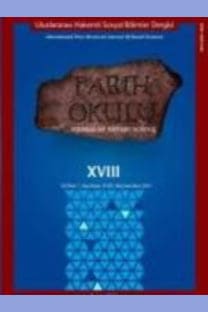THE BALKANS IN TURKISH HISTORIOGRAPHY: A PRELIMINARY DISCUSSION
Dünya’nın her yerinde, her ülke milliyetçilik akımından sonra kendi milletine uygun bir ‘tarih’ üretmek istemiştir. Unutulan örf, adetler ve destanlar tekrar kullanılmıştır bu millet inşa etme sürecinde. Başka bir seçenek ise tarihindeki bazı acı olayları unutmaya çalışmaktır. Türkiye bunun en güzel örneğidir, Balkan Savaşları’ndan sonra başına gelen tüm acı olayları yeni kurulan Türkiye Cumhuriyeti’ne yansıtmamak için kendi tarih yazımbiliminde yeterince ilgi verilmemiştir. Bu ihmalkarlık belki Türk milletinin yaşadığı tüm zülümlere rağmen başka milletlere karşı kin ve nefret beslememesine yol açmış olsa bile, aynı zamanda boş bırakılan bu alanlar başka millet tarafından kendi çıkarları için çok daha farklı gösterilmiştir. Bunlardan en meşhur örnek ‘soykırım’ olarak kullanılmaya çalışılan 1915 olaylarıdır. Tıpkı Balkan Savaşları’ndaki gibi, 1915 olaylarında da bir çok Türk zülüm ve işkenceye maruz kalıp zorunlu göç ile etnik temizleme gibi geniş çaplı Türk düşmanı haraketlere tabi tutulmuştur. Bunun dışında Anadolu bölgesi ‘Türklerin Anayurdu’ ilan edilirken, Balkan bölgesinin aslında Türk tarihinde çok daha önem taşıdığını da unutmamak lazım. Binlerce yıl Balkanlarda yaşayan farklı Türk budunları, ya başka halklarla karışıp kaybolmuştur ya da daha önce bahsettiğimiz etnik temizleme yöntemlere maruz kalmıştır. Bu acıları unutmak için Balkan Savaşları olsun, 1915 olayları olsun Türkiye’de uzun süre ihmal edilmiştir. Bu araştırma sadece yüzeysel olarak bu konulara daha çok odaklanması gerektiğini vurgulayan çalışmadır.
Anahtar Kelimeler:
Millet İnşa Etmek, Türk Tarihi, tarih yazımbilimi, Balkan, 1915 olayları
Türk Tarihyazımında Balkanlar: Bir Giriş
Throughout history nations have tried to establish their own ideas of nationalism. In doing so, each country aimed to create their own version of 'history. In order for them to succeed, long-forgotten traditions, customs and legends were put to use in the process of nationbuilding. Another aspect, opposite ‘emphasizing forgotten aspects of history’, was to neglect some historical events in order to enable people to forget these traumatic events. One fine example is Turkey, which tried to neglect all the painful events that happened during and after the Balkan Wars in order to start the newly founded Republic of Turkey with a clean sheet. This was probably due to the fact that the newly established Turkish nation should not be based upon the atrocities committed against the Turks by others, nor the hatred against those who were responsible for these deeds. The most famous example of these atrocities are the events of 1915, mistakenly labeled 'genocide' by some. Just as during the Balkan Wars, the events of 1915 exposed a large number of Turks to persecution and torture; as well as large-scale ethnic cleansing and forced migration. Therefore the remaining region, Anatolia, was proclaimed the 'Turkish Motherland'; which is interesting since the history of Turks in the Balkan region is far more stretched. Turkish tribes entered the Balkan some thousands of years prior to Anatolia, but eventually either assimilated or were victims to the previously mentioned methods of ethnic cleansing; in both cases they subsequently disappeared from history. To forget the pain of the Balkan Wars as well as the events of 1915, Turkey has long been neglecting these aspects of its own history This paper should be seen as a preliminary research in an attempt to put more of an emphasize on this field of study.
Keywords:
Nationbuilding, Turkish History, Historiography, Balkan, happenings of 1915,
- ISSN: 1308-5298
- Başlangıç: 2008
- Yayıncı: Ahmet KARA
Sayıdaki Diğer Makaleler
TEMETTÜAT DEFTERLERİNE GÖRE TURGUTLU’NUN SOSYAL VE EKONOMİK DURUMU (1844- 1845)
DEMOKRAT PARTİ’NİN DEMOKRASİ SÖYLEMLERİ ( 1946-1957 )
MEDRESELERİN ISLAHI KONUSUNDA SULTAN II. ABDÜLHAMİD’İN HAZIRLATTIĞI BİR LAHİYANIN TAHLİLİ
İZMİR LİMAN’INDAN ZEYTİNYAĞI İHRACATI (1869- 1912)
TUFAN GÜNDÜZ, NİSANIN 2 GÜNÜ, Yeditepe Yayınevi, İstanbul 2011, ISBN: 978-605-4052-59-2
THE BALKANS IN TURKISH HISTORIOGRAPHY: A PRELIMINARY DISCUSSION
HİNDİSTAN’DA TÜRKLÜK MÜSLÜMAN TÜRK İMPARATORLARI HÜMÂYÛN ŞAH
